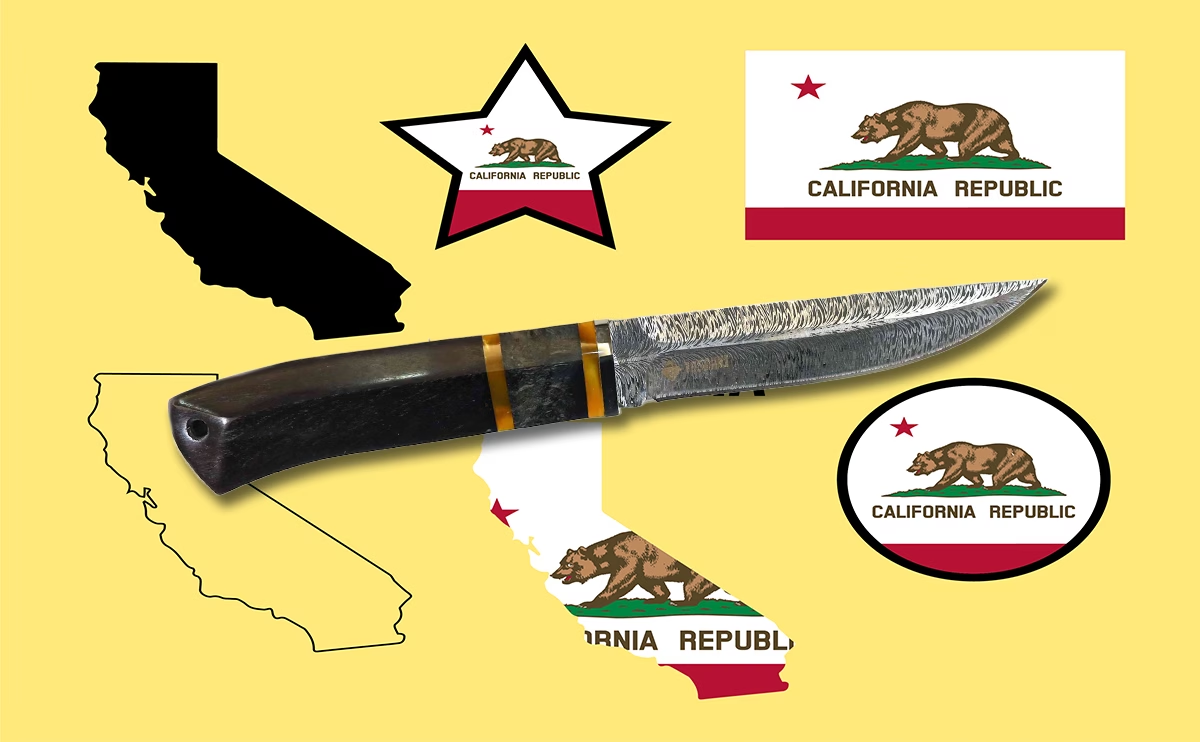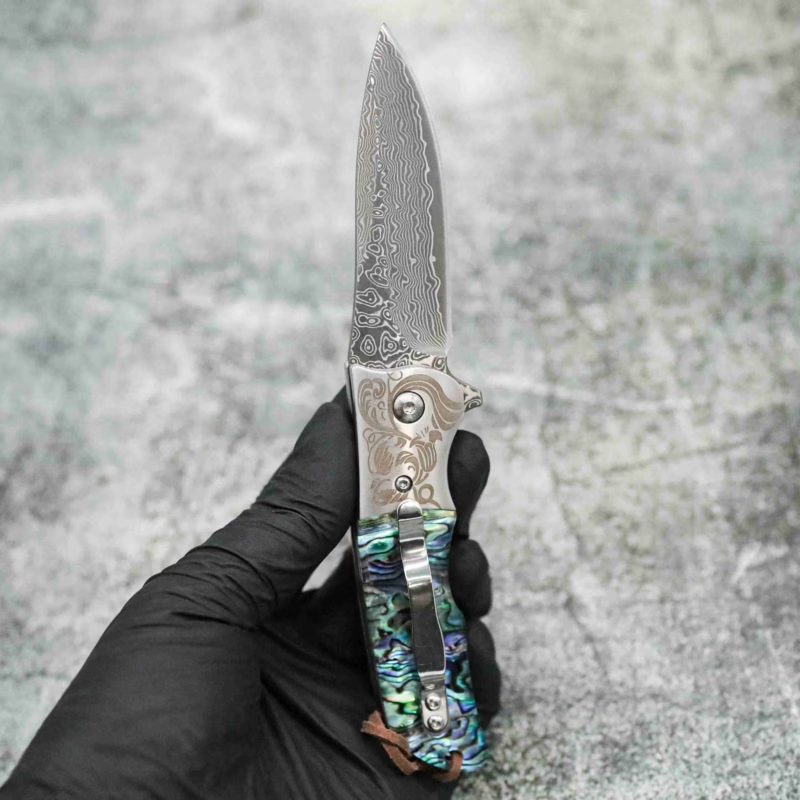2025 California Knife Laws: A Comprehensive Guide to Knife Regulations in California

Knife laws in California can be pretty complicated, as the state has some of the strictest regulations in the United States. Whether you’re a collector, a hunter, or someone carrying a knife for self-defence, it’s crucial to understand the legal nuances surrounding knife ownership, possession, and carry in California. This article will provide an in-depth look at California knife laws, covering everything from legal knife types to where and how knives can be carried.
Table of Contents
Understanding California Knife Laws
California knife laws are governed by both state and local regulations. These laws dictate what types of knives are legal to own, carry, and use. Laws can vary significantly between cities or counties, so it’s essential to be aware of the specific rules in your locality.
Legal Types of Knives in California
Not all knives are created equal in the eyes of the law. Certain types of knives are legal to own and carry, while others are prohibited due to their dangerous nature. Some of the most common legal knives in California include:
- Fixed Blade Knives: These knives have a blade permanently attached to the handle. Fixed-blade knives, such as hunting knives or survival knives, are generally legal to own and carry openly, provided they meet other conditions.
- Folding Knives: Folding knives with blades less than 2.5 inches long are legal for both open and concealed carry. However, folding knives with blades over 2.5 inches may be subject to certain restrictions depending on how and where they are carried.
- Butterfly Knives: Also known as balisongs, these knives are typically illegal to carry in California. However, owning them in your home is generally legal, provided they are not being carried in public or used in a threatening manner.

What Knives Are Illegal in California?
California law prohibits possessing, selling, or transporting certain types of knives. Understanding what knives are considered illegal in California can help you avoid breaking the law. Some of the knives that are generally banned include:
- Automatic Knives: Also known as switchblades, these knives feature a blade that automatically deploys when a button or lever is pressed. They are illegal to carry in California, though there are exceptions for certain professionals, such as law enforcement officers and military personnel.
- Daggers and Dirks: Any knife with a double-edged blade designed for stabbing, such as daggers or dirks, is illegal to carry concealed in California. While they may be legal to own, they can be illegal to carry unless you’re on your private property or engaging in certain activities like target practice.
- Gravity Knives: These knives use gravity to deploy the blade. Like automatic knives, they are typically prohibited in California, with few exceptions for those who use them for professional purposes.
Open Carry and Concealed Carry of Knives in California
One of the most important aspects of California knife laws is understanding the rules surrounding how knives can be carried. Whether you’re carrying a folding knife, fixed blade knife, or other types of knives, knowing when and where they can be carried is crucial for avoiding legal troubles.
Open Carry of Knives
In California, open carry of knives is generally allowed as long as the knife is visible and not hidden from view. However, there are restrictions on the size and type of knife that can be openly carried. For example:
- Fixed Blade Knives: These knives are typically legal to carry openly as long as they are not prohibited types (such as daggers). However, if you carry a large fixed-blade knife in a manner that could be interpreted as threatening, you may violate California law.
- Folding Knives: Folding knives are generally legal for open carry, as long as they are not illegal, such as switchblades or knives over 2.5 inches in blade length. Remember that even if a knife is legal to carry, it should be done in a manner that does not alarm the public or cause safety concerns.
Concealed Carry of Knives
Concealed carry of knives is heavily regulated in California. Generally, you cannot carry a knife hidden on your person unless you have a valid concealed carry permit. The following rules apply to concealed knife carry:
- Folding Knives: Folding knives with a blade less than 2.5 inches long are typically legal for concealed carry. Knives over 2.5 inches are subject to different regulations and may be considered illegal to carry concealed.
- Fixed Blade Knives: Fixed blade knives are generally illegal to carry concealed unless you are engaged in activities like hunting or camping. Concealed fixed-blade knives could be deemed as weapons intended for criminal use, leading to the possible arrest or legal consequences.
- Exceptions for Concealed Carry: Certain professionals, such as law enforcement officers, security guards, or military personnel, may be exempt from some of the restrictions on concealed carry. Additionally, if you carry a knife for recreational purposes like camping, hiking, or hunting, you may be allowed to carry knives concealed as part of your gear.
Where Can You Legally Carry Knives in California?
The location where you can carry a knife is equally important as how you carry it. California law imposes certain restrictions on where knives can be carried. Some areas where knives are prohibited include:
- Schools and Educational Institutions: It is illegal to carry a knife on school grounds, including primary schools, secondary schools, and colleges. This applies even if the knife is kept in your vehicle or on your person.
- Government Buildings and Airports: Knives are prohibited in government buildings, such as courthouses, post offices, and airports. Carrying knives in these places could lead to serious legal consequences.
- Public Places: Carrying a knife in public areas is not illegal by default, but it becomes a legal issue if the knife is used threateningly. For instance, if you are carrying a large knife in a public space without a reasonable explanation, it could be considered a violation of public safety laws.
Penalties for Violating California Knife Laws
California enforces strict penalties for those who violate its knife laws. The severity of the penalty depends on the type of violation and whether it involves the possession or use of a prohibited knife.
- Misdemeanour Charges: If you are found carrying a prohibited knife (such as a switchblade) or carrying a concealed knife illegally, you may be charged with a misdemeanour. This could result in fines or jail time for up to one year.
- Felony Charges: In more severe cases, such as when a knife is used in a violent crime, felony charges may apply. This could lead to longer prison sentences and heftier fines.
- Civil Penalties: In addition to criminal charges, you may face civil penalties such as fines or the confiscation of the knife.
Conclusion
Navigating California’s complex knife laws requires careful attention to detail and an understanding of the various rules surrounding knife possession, carry, and use. While California allows the ownership and carry of certain types of knives, strict regulations govern how and where these knives can be carried. By adhering to state and local regulations, you can avoid legal issues and ensure that your knife use remains lawful.
FAQs
1. Is it illegal to carry a pocket knife in California?
No, carrying a pocket knife is legal as long as the blade does not exceed 2.5 inches and the knife is not used as a weapon.
2. Are there any exceptions for carrying a switchblade?
Switchblades are generally illegal, but there are exceptions for certain professionals, such as law enforcement or military personnel.
3. Can minors own knives in California?
Minors are allowed to own knives, but there are restrictions on the types and sizes they can possess, such as a blade length limit of 2.5 inches.
4. Can I carry a knife in my car in California?
Yes, knives can be legally carried in a car, but they must be stored in a place where they are not readily accessible to the driver or passengers.
5. What is the penalty for carrying a prohibited knife in California?
Carrying a prohibited knife can result in criminal charges, including fines, imprisonment, or both, depending on the circumstances.




